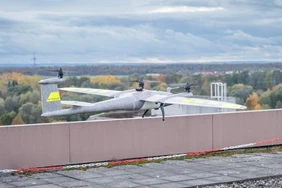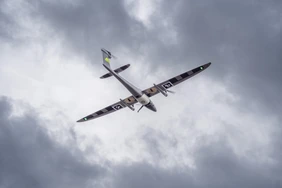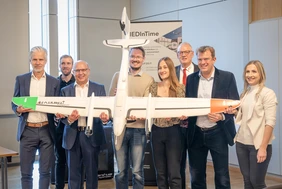Anyone who looked up into the sky between Ingolstadt and Pfaffenhofen today might have made a discovery: This afternoon, an automated aircraft drone flew from Ingolstadt Hospital to Pfaffenhofen, laying the foundation for the development of new transport routes for emergency medications in the region.
The marathon distance also became a groundbreaking route for the aircraft, as it covered the good 43 kilometers between Ingolstadt Hospital and Ilmtalklinik Pfaffenhofen in 38 minutes. By car, this distance can take twice as long, depending on traffic conditions.
Federal Transport Minister Dr. Volker Wissing: "Drones can save lives. They can make all the difference when it comes to getting supplies to people in remote areas quickly or getting vital medical supplies from point A to point B. That's why we as an industrialized nation must be open to technology - especially with regard to the use of drones. Germany is at the forefront of this development. We want to further expand this pioneering role in unmanned flight. I will do everything I can to ensure that medicine transports by drone will soon be possible on a large scale."
Three years ago, drone manufacturer Quantum Systems from Gilching near Munich launched the MEDinTime project, funded by the German Federal Ministry of Digital Affairs and Transport (BMDV) with a total of 961,624 euros, to speed up the delivery of emergency medications such as anticoagulants for accident victims or antibiotics for patients in the region. In addition to Klinikum Ingolstadt, the lmtalklinik Pfaffenhofen and the district of Pfaffenhofen, Technische Hochschule Ingolstadt and the Bayerisches Rotes Kreuz are also involved in the pilot project.
The project further developed drone technology in the specific application context and developed a standardized digital process for the delivery of emergency medications. The hospital pharmacy at Klinikum Ingolstadt currently supplies the Ilmtalklinik as well as ten other hospitals and four rescue services in the region with medications. "By using drones as a means of transport, emergency medications could be transported faster and more in line with demand in the future. At the same time, the environment can be protected and costs saved," says Pierre Ulfig, the person responsible for the "MEDInTime" project.
A particular challenge in the project was the aviation law requirements that had to be met for the automated drone flight outside the pilot's line of sight. Today's test flight showed that the fast and safe transport of medicines by drone on the route between Ingolstadt and Pfaffenhofen is technically feasible, according to the summary of those responsible for the project. The knowledge gained forms the basis for the future supply of emergency medications using new technologies. Further use cases, such as the creation of special aerial photographs of disaster areas or the recording of major damage events in real time, can build on the project results.





![[Translate to English:] Logo Akkreditierungsrat: Systemakkreditiert](/fileadmin/_processed_/2/8/csm_AR-Siegel_Systemakkreditierung_bc4ea3377d.webp)








![[Translate to English:] Logo IHK Ausbildungsbetrieb 2023](/fileadmin/_processed_/6/0/csm_IHK_Ausbildungsbetrieb_digital_2023_6850f47537.webp)


